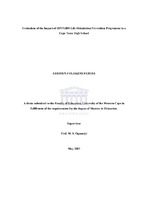Evaluation of the impact of HIV/AIDS Life Orientation Prevention Programme in a Cape Town High School
Abstract
The rate at which the spread of human immunodeficiency virus/auto immunodeficiency syndrome (HIV/AIDS) is increasing in the world has brought with it the realization that the disease is more complex and extensive than imagined. The alarming increase in the rate of infection combined with the fact that researchers have not found a cure has considerable socioeconomic implications. The peculiarity of HIV/AIDS, has caused almost all countries of the world to introduce different types of intervention programmes for the youth in order to reduce or eradicate the disease. South Africa, being one of the countries in the world that has the highest number of people living with HIV/AIDS, has introduced a Life Orientation Programme (LOP) into the school curriculum as a preventive measure. HIV/AIDS prevention programmes as part of the LOP are designed to increase the knowledge and skills of youths in order to adopt and maintain good sexual behaviours that can virtually eliminate the risks of becoming infected with the HIV. This study evaluates the effectiveness, efficiency, relevance and impact of LOP on the sexual behaviours of the learners in a high school in Cape Town. The study was motivated by the fact that, despite the introduction of different intervention and prevention programmes in high schools, there seems to be no significant reduction in the spread of HIV/AIDS among the youths.
In order to make this evaluation worth the while, four instruments, (questionnaires, semistructured interviews, a classroom observation schedule and a test), were used in the study with the consent of the participants and the school authorities. The participants (the teachers and learners) were contacted independently by an educator who was introduced to me by the principal, so that the researcher would not influence the information provided.

